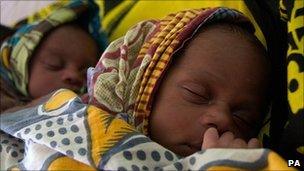Four million poor children dying 'of neglect'
- Published

Save the Children says government policies are failing to help the world's poorest youngsters
Nearly four million child deaths over the past 10 years could have been prevented if states were able to help the poorest, says Save the Children.
In another report, the UN children's agency Unicef also highlights a huge divide between children from rich and poor backgrounds.
The hard-hitting reports come two weeks before a summit in New York on the Millennium Development Goals.
The goal of drastically cutting child mortality is one of the most off-track.
"We reached this conclusion through an exhaustive study over the last four months," says Anthony Lake, the new executive director of Unicef on BBC World Service.
The message of both reports is that helping a country to become wealthier does not necessarily mean more children's lives will be saved, says Mike Wooldridge, BBC's World Affairs Correspondent.
Save the Children says methods used by many developing countries to reduce child mortality end up saving children from comparatively better off communities while those from the most disadvantaged backgrounds go untouched.
It describes it as a dangerous trend.
According to Unicef, children from the poorest 20% of households in the developing world are more than twice as likely to die as children from the wealthiest 20%. It warns that this gap if widening.
The poorest children "have a harder time accessing health services," says Aboubacry Tall of Save the Children. "And if you do not put them at the centre of your policy, the likelihood of them missing out is much greater," he adds.
The reports acknowledge the difficulties in reaching the most vulnerable children, however it says the benefits can be enormous if they are reached.
"The payoff is bigger if you are treating children who are suffering from more diseases rather than treating children in better off communities who are suffering from fewer diseases," says Anthony Lake of Unicef.
"The needs are greatest in the poorest communities," he says.
The agencies say some countries have shown that focusing on the poorest can reduce child mortality dramatically.
"There are examples like Ghana where you can see that if you can target the very poorest, you can achieve a very large-scale effect," says Britain's minister for international development, Stephen O'Brien.
He says Britain is trying to put more emphasis on reaching vulnerable women and children "that's precisely what the new coalition government is determined to achieve," he says.